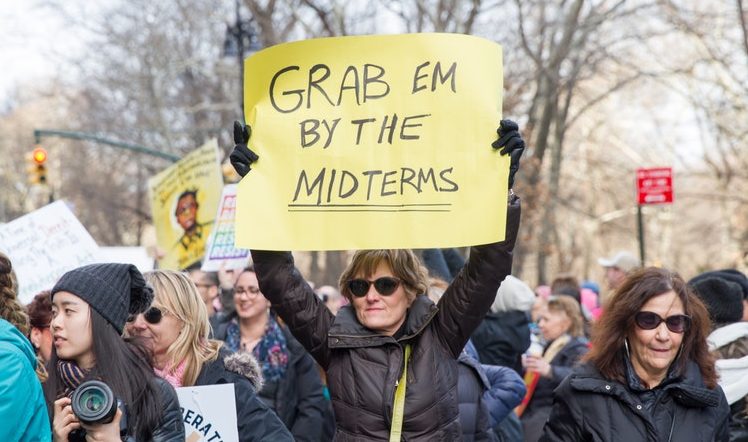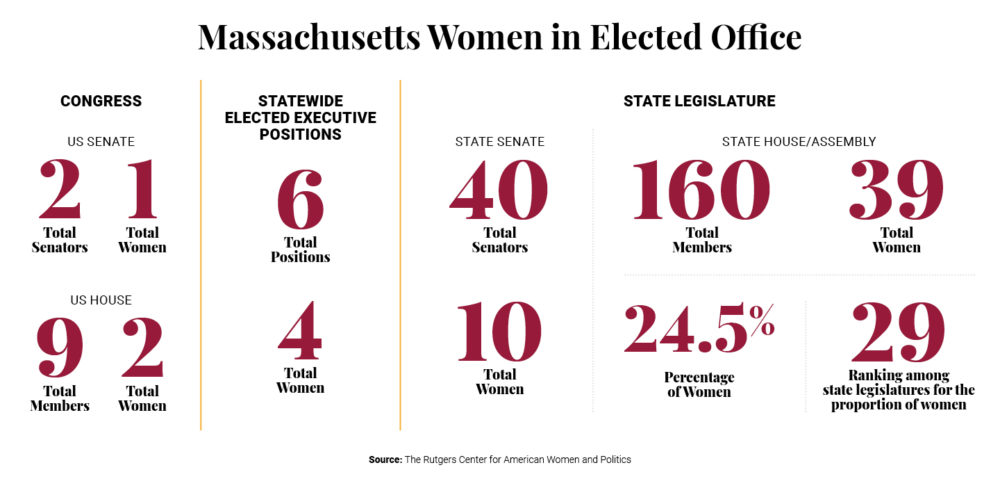
Photo: Mirah Curzer
Sign of the times: A call for action at the Women’s March in New York City
Over the past year, the #MeToo movement, fourth-wave feminism, and a divisive White House have driven a record number of women across the country to run for public office. In state houses, governor’s mansions, and the halls of Congress, the flood of female candidates is likely to yield a more gender-balanced caste of leadership in American politics.
In Massachusetts, one of Hillary Clinton’s strongest states in the 2016 presidential contest, a record 146 women—30 percent of the total candidates—will appear on the fall primary election ballot, most of them as first-time candidates, for offices ranging from district attorney and state senator to register of deeds and member of Congress.
Of those, about 70 have received the backing of the Massachusetts Women’s Political Caucus, which since 1971 has sought to boost the number of women elected to public office and appointed to public policy positions.
To us, it symbolizes a new day in politics and a bright possibility for how things are governed. — Gail Jackson-Blount, board president of the MWPC
“As a nonpartisan, pro-choice women’s organization, we are very excited to have endorsed a record number of women running for political office in Massachusetts in this 2018 election cycle. To us, it symbolizes a new day in politics and a bright possibility for how things are governed,” Gail Jackson-Blount, board president of the MWPC, tells Exhale.
“Women are very collaborative and by having more women in political leadership positions, more women will have a seat and voice at the table when decisions are being made that impact critical issues in our society, ranging from women’s family rights to the economy and the environment,” she adds.
While two out of every three elected offices in the Bay State are held by men, the caucus points to greater success for women in some of the state’s highest offices. Four out of six state constitutional offices are held by women—Lt. Gov. Karyn Polito, Attorney General Maura Healey, Treasurer Deborah Goldberg, and Auditor Suzanne Bump. Elected by her colleagues, state Sen. Karen Spilka is the third woman to serve as Senate president in the state legislature.

Meanwhile, U.S. Sen. Elizabeth Warren is the state’s first woman to represent Massachusetts in the upper chamber in Washington, and over on the other side of Capitol Hill, two of the delegation’s nine members are women—Rep. Niki Tsongas and Rep. Katherine Clark.
Except for Tsongas, all are running for re-election while five women are among the candidates vying to replace Tsongas for her Lowell-based seat. They are among a dozen female candidates seeking Bay State congressional seats this fall.
Up on Beacon Hill, 12 of 40 state senators and 38 of 160 state representatives are women. With just 25 percent of the legislative offices, there’s a long way to close the power disparity gap.
While Gov. Jane Swift was elevated from lieutenant governor to serve a brief two years after the late Paul Cellucci resigned to serve as ambassador to Canada, no woman has ever been elected to the Bay State’s corner office. That won’t change this year. But in other states, 62 women went on the ballot for governor this year, breaking the record of 34 set in 1994.
In the meantime, here in Massachusetts the caucus pledges to continue recruiting and nourishing new candidates and is enthusiastic about the batch it’s endorsed during this turbulent cycle.
“These women are extremely capable, their campaigns are viable, and they are highly motivated to win,” Laurie Martinelli, executive director of the MWPC, tells Exhale “The experience we have seen in the past few weeks among these women candidates is stunning.”
Women’s priorities are often family and community,
so when women win, society wins. — Laurie Martinelli, executive director of the MWPC
According to Martinelli, 29 out of the 36 candidates that MWPC endorsed last year won their elections. That’s an impressive 80 percent.
“We’re aiming for a higher success rate in 2018,” says Martinelli. “The goal of the Massachusetts Women’s Political Caucus is to elect 51 percent women at the local, state, and federal level.”
It’s important, adds Martinelli, because “women bring a fresh perspective to politics. Women’s priorities are often family and community, so when women win, society wins.”
“In today’s political climate, it is imperative that government, and every industry, have leadership that reflects the world in which we live,” says Jackson-Blount. “The MWPC is incredibly proud of all women who serve in politics and public policy positions, and especially proud of those who are running for the first time in our commonwealth.”
Exhale caught up with three local candidates to talk overcoming challenges, how women running for office isn’t just a fad, and the importance of “sheroes.”



 4 min read
4 min read
